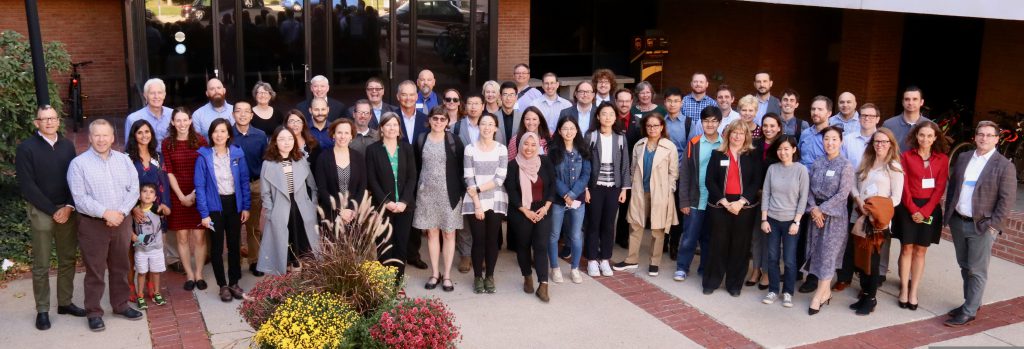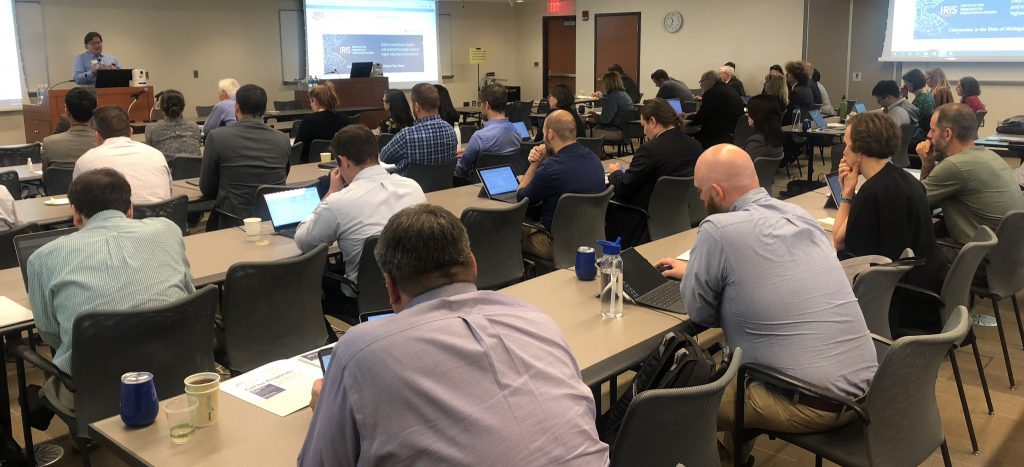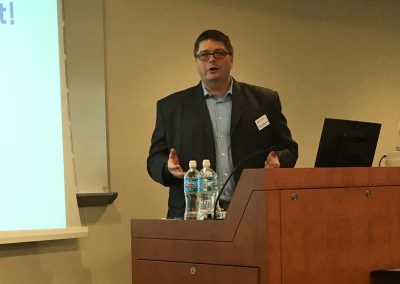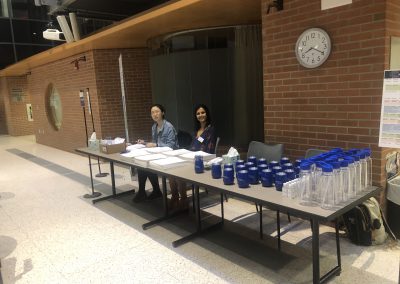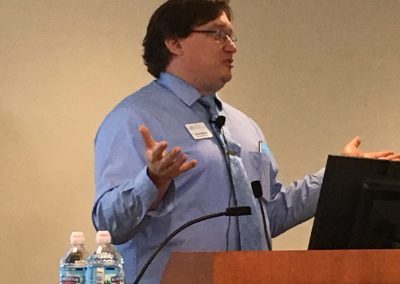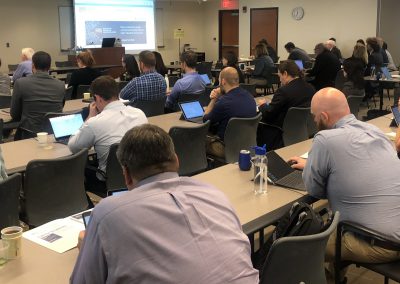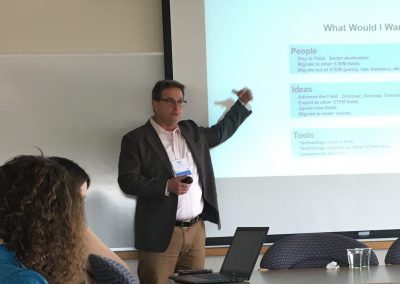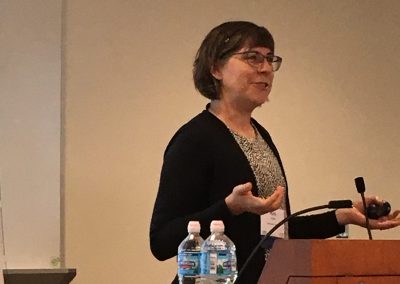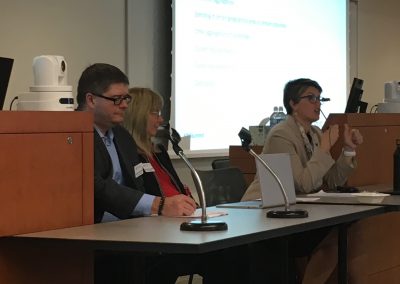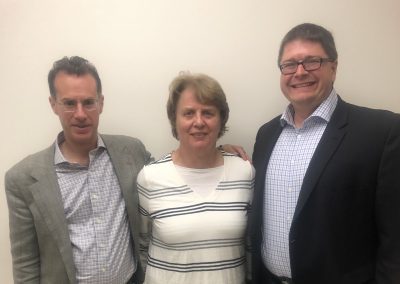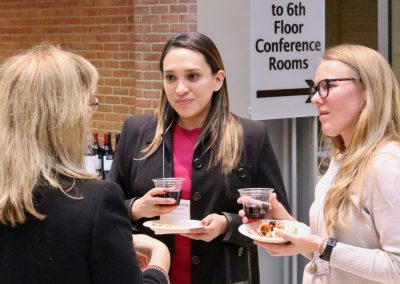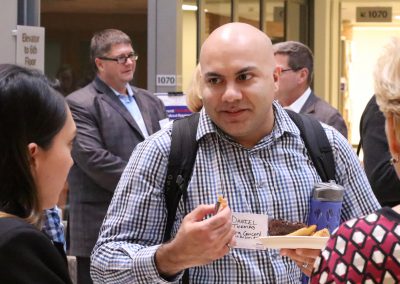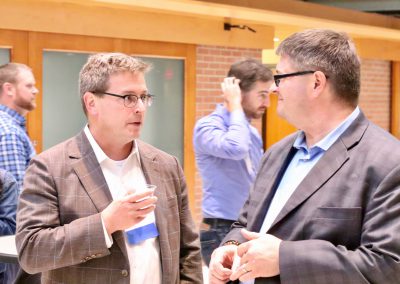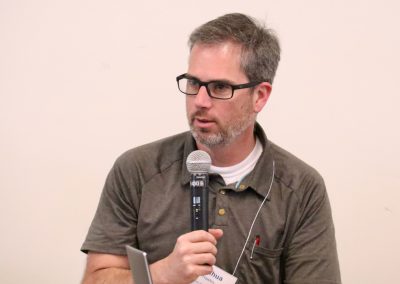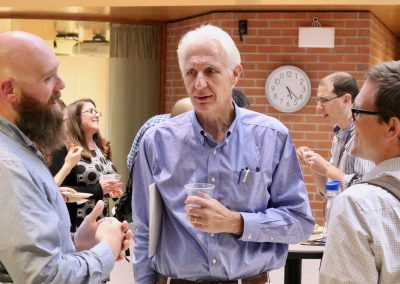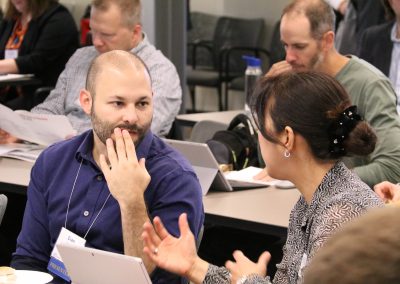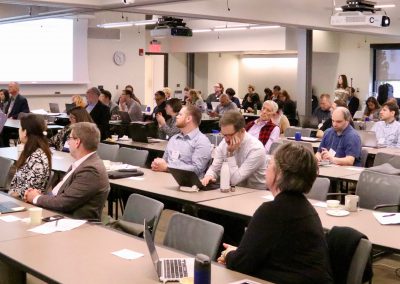IRIS Summit
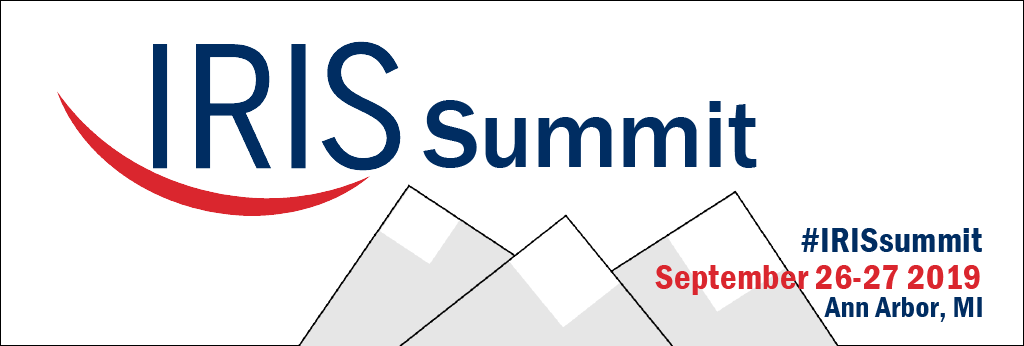
The Institute for Research on Innovation and Science (IRIS) hosted its first-ever integrated IRIS Summit, featuring discussions on data, policy, and research. The free event was open to all with an interest in using administrative data to better understand, explain, and improve higher education.
Sessions focused on:
- data products that tell the story of academia’s public value
- research questions
- using and improving the IRIS data infrastructure.
Date: September 25-27, 2019
Location: University of Michigan, Institute for Social Research, 426 Thompson Street, Room 1430, Ann Arbor, MI
Speakers: Matt Owens, Vice President for Federal Relations, Association of American Universities; Sheila Martin, Vice President for Economic Development and Community Engagement, Association of Public and Land-grant Universities, Steve Heinig, Director, Science Policy, Association of American Medical Colleges; Jason Owen-Smith, Executive Director, IRIS; Kimberly Griffin, Director for Electronic Research Administration, Northwestern University; John Gonzalez, Director of Institutional Research, Rackham Graduate School, University of Michigan; Britany Affolter-Caine, Executive Director of University Research Corridor (Michigan); Michael Holland, Vice Chancellor, Science Policy and Research Strategies, University of Pittsburgh; IRIS Co-PIs Julia Lane, New York University and Bruce Weinberg, The Ohio State University; researchers from around the country using IRIS data for their work; and more.
Summit Opening — Jason Owen-Smith, IRIS Executive Director, and
Rebecca Cunningham, Interim Vice President for Research, University of Michigan
• Kevin Bjorne, Technical Director, IRIS
• Natsuko Nicholls, Research Manager, IRIS
• Beth Uberseder, Research Support Specialist, IRIS
• Kimberly Griffin, Director of Electronic Research Administration, Northwestern University
• Andrew Sallans, Assistant Director for Electronic Research Administration, University of Virginia
Lunch & State of IRIS, Jason Owen-Smith, Executive Director
Policy Plenary Session. “Perspectives on Making the Case for Research Universities”
• Matt Owens, Vice President for Federal Relations, Association of American Universities;
• Sheila Martin, Vice President for Economic Development and Community Engagement, Association of Public and Land-grant Universities,
• Steve Heinig, Director, Science Policy, Association of American Medical Colleges
• Facilitator: Cynthia Wilbanks, Vice President for Government Relations, University of Michigan
IRIS 101: Overview for Data Providers, Researchers and Policy Makers
|
Data Track “Canonical Linkages of Employees and Research Grants,” Natsuko Nicholls, Research Manager; Matthew Room 1430 VanEseltine, Research Investigator; and Raphael Ku, Research Support Associate, IRIS |
|
Research Track Research Talks: Gerald Marschke, Associate Professor of Economics, and Holden Deithorn, Ph.D student, Room 6050 SUNY-Albany; Jacob Fisher, Research Investigator; Jinseok Kim, Research Assistant Professor, IRIS |
|
Policy Track “How Graduate Schools Can Incorporate IRIS Data Into Analytic Strategies,” John Gonzalez, Director Room 6080 of Institutional Research, Rackham Graduate School, University of Michigan; Allyson Flaster, Assistant Research Scientist, ICPSR; Jason Owen-Smith, Executive Director, IRIS |
|
Data Track “The Evolution of Job Title Classification: A Prototype,” Kevin Bjorne, Technical Director; Robert Truex, Data Room 1430 Manager; Elissa Irhamy, Research Associate, IRIS |
|
Research Track Research Talks: Jason Coupet, Assistant Professor of Public Administration, North Carolina State Room 6050 University; Doug Guilbeault, PhD student, Communications, University of Pennsylvania; Elan Segarra, PhD student, Economics, University of Wisconsin; Elias Samuels, Michigan Institute for Clinical and Health Research; Yian Yin, Graduate Research Assistant, Complex Systems, Northwestern University |
|
Policy Track “Telling Stories With IRIS Data,” Dan Meisler, Communications Coordinator, IRIS; Alex Piazza, Room 6080 Communications Manager, U-M Office of Research; Dale Ulrich, Professor of Kinesiology, U-M |
Data Plenary Session. “Opportunities for Data Aggregation” — Britany Affolter-Caine, Executive Room 1430 Director, University Research Corridor (Michigan); Jason Owen-Smith, Executive Director, & Amy Butchart, Lead Programmer, IRIS
Novel Approaches to Working with Administrative Data”
• MariJane Selvaggio, Account Executive, Equifax Workforce Solutions
• Wan-Ying Chang, Mathematical Statistician, National Center for Science and Engineering Statistics
• Shawn Klimek, Assistant Center Chief for Business Research, U.S. Census Postsecondary
Education Outcomes
• Timothy McKay, Professor of Physics, University of Michigan, Sloan Equity and Inclusion in STEM Introductory Courses (SEISMIC) project
|
9:15 – 10:45 a.m. Research Plenary Session. “New Findings from Research with IRIS Data” Room 1430 • Julia Lane, Professor, Wagner School for Public Policy, New York University |
|
• Bruce Weinberg, Professor of Economics, The Ohio State University |
|
Data Track “An IRIS Project to Better Match and Report Grant Data: The Award ID Pilot,” Kevin Bjorne, Room 1430 Amy Butchart, IRIS; Chris Allan, Business Systems Analyst, Institute for Social Research, University of Michigan |
|
Research Track Research Talks: Alex He, Assistant Professor of Economics, University of Maryland; Room 6050 Kevin Kniffin, Assistant Professor of Management and Organizations, Cornell University; Ran Xu, Assistant Professor, University of Connecticut |
|
Policy Track “Using IRIS Data for Accountability and Research,” Michael Holland, Vice Chancellor for |
|
Data Track Kevin Bjorne, Technical Director, IRIS |
|
Research Track Natsuko Nicholls, Research Manager, IRIS |
|
Policy Track Dan Meisler, Communications Coordinator, IRIS |
Download detailed agenda, with session descriptions and research abstracts (PDF)
More than 90 people participated in the 2019 IRIS Summit, either in person or remotely, representing a 50% increase from last year. We’re extremely pleased that so many attendees were able to join us for an expanded summit, which featured parallel tracks on data, research, and policy, resulting in a truly rich set of conversations.
Nearly 50 organizations were represented at the summit:
- 20 IRIS staff and faculty
- 3 IRIS board members
- Representatives from 21 IRIS member universities
- 7 prospective IRIS member universities
- University Research Corridor
- U.S. Census Bureau
- National Center for Science and Engineering Statistics
- Association of American Universities
- Association of Public and Land-grant Universities
- Association of American Medical Colleges
- Unizen
- RTI International
- Bureau van Dijk
- Equifax Workforce Solutions
We developed the three tracks for the conference based on input from attendees at the 2018 summit, who asked for a greater diversity of focus. Initial feedback from this year’s summit indicate this was a successful approach, allowing participants to dive deeply into topics of personal interest and also providing high-level overviews relevant to the entire group.
The data track highlighted work being carried out by the IRIS team to enhance linkage, to propose a new approach to job title classification, and to improve matching and reporting of award data, each highlighting challenges and innovative solutions. The data plenary highlighted not only the importance of aggregation in terms of reporting, but also underscored philosophical approaches to thinking about it, on two axes: global to local, and general to specific.
The research track featured the work of a wide variety of researchers accessing UMETRICS data to answer a diverse set of research questions. The research plenary featured a discussion of evi- dence-based policy and the work of the Coleridge Initiative at NYU to link UMETRICS and SED/SDR data, followed by an overview of research focusing on resource allocations across principal investigators. The sessions underscored the notion that UMETRICS is about capturing insights about people.
The policy track highlighted some compelling examples of the ways in which IRIS UMETRICS data can be used to augment efforts already under way. Presenters discussed the ways in which funding decisions are made about research, how graduate schools can track student outcomes, and an example of storytelling that was deeply touching. The policy plenary featured a panel of presenters from three major higher education organizations during which the conversation underscored the importance of messaging. Representatives also underscored the demand for accountability and the need to have data that can tell the story.
We also identified several broad themes at this year’s Summit that resonated across the tracks.
Expansion and integration. There was a general sense that our community – which includes data providers, researchers, and policy makers – is becoming more expansive and integrated, with a deeper understanding of the interconnections between the general areas of focus. Whether we are submitting data or parsing it to answer a question or using it to tell a story to a key stakeholder, we all benefit when we understand how we fit into the bigger picture.
Exploring new questions and storytelling. Enhanced data cleaning and new data linkages enable researchers to ask new questions of the data, and permit decision makers to dive deep into the data to help tell their stories. There was also a recognition that research universities have a great opportunity to make our case through data-driven stories that IRIS can help discover.
Aggregation and transformation. The real power of data like UMETRICS is in the ability to combine them with other, related datasets to better explore more fine-grained experiences and outcomes. In doing so, we can transform simple datasets that allow us to track purchases or grant awards into data resources that can help us better understand priorities, interdisciplinarity, and the function of science.
Mark your calendars! The 2020 IRIS Summit is slated for September 24-25. Look for more details to come, and reach out to Nancy Calvin-Naylor at [email protected] if you would be interested in serving on a planning committee.
Photo Gallery
2019 IRIS Summit
IRIS Board of Directors member Mike Holland, University of Pittsburgh, presents on using IRIS data for accountability and research.
2019 IRIS Summit
IRIS Board of Directors member Kimberly Griffin, Northwestern University, describes how her campus used the IRIS press release template to publicize economic impact data.
2019 IRIS Summit
Jason Owen-Smith and Amy Butchart of IRIS and Britany Affolter-Caine, Executive Director of the University Research Corridor, present the data plenary on opportunities for data aggregation.
2019 IRIS Summit
IRIS co-founders Bruce Weinberg (left), Ohio State University; Julia Lane, New York University; and Jason Owen-Smith, University of Michigan.
2019 IRIS Summit
Mike Holland, University of Pittsburgh Vice Chancellor for Science Policy and Research Strategies and IRIS Board of Directors Member, left, and Jason Owen-Smith, IRIS Executive Director.
2019 IRIS Summit
Elan Segarra, Economics Department, University of Madison, left, and Natsuko Nicholls, Research Manager, IRIS

